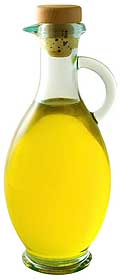Olive Oil Nutrition Facts

Olive oil has been thought of as 'liquid gold' due to its amazing health benefits. Apart from providing the body with much-needed, essential fatty acids, olive oil has been added to soaps, shampoos and conditioners due to its rich, moisturising properties. It has also been used in cosmetics and as fuel for oil lamps.
Olive oil is a vegetable oil that has been extracted from crushed olives. There are over 750 million olive trees that have been cultivated worldwide, with about 95% being in the Mediterranean. The top producing countries of olive oil include Spain, Italy, Greece, Turkey, Syria, Tunisia, Portugal, the United States and France.
When it comes to culinary olive oil, there are various grades:
Virgin olive oil means that the oil was produced without any chemical treatments. This type of oil is generally darker than refined olive oil.
Refined olive oil means that the oil was produced using chemicals and is of lower quality oil than virgin olive oil.
Extra virgin olive oil contains no more than 0.8% acidity, while virgin olive oil has an acidity of less than 2%.
Standard olive oil has 1% acidity, however, it commonly lacks a strong aroma and flavour.
Olive oil is rich in antioxidants, which help to fight of free radicals causing damage to cells. It may help lower blood pressure and may protect the body against cardiovascular disease.
Olive oil plays an important role within the immune system as it protects it against bacteria and/or viruses. It also aids the digestive system by inhibiting gastric motility. Apart from its nutritional benefits, olive oil may assist with anti-aging by releasing anti-oxidants such as vitamin E and polyphenols and assisting in the lubrication of joints, thereby reducing the risk of bone degeneration.
It has been used in many beauty products as it provides excellent nourishment to the skin, nails and hair.
One cup, or 216 grams of olive oil contains 1901 calories and 216 grams of fat. Of this fat content, only 29.1 grams are saturated, while 21.6 grams are polyunsaturated and 159.6 grams are monounsaturated. Both poly- and monounsaturated fats are good for the body as they help fight off fat.
Author: Dimi Ingle
Copyright: Remedium. This article may not be copied, in whole or in part, without the written consent of Remedium.
|